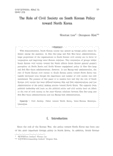

PARTNER
검증된 파트너 제휴사 자료
The Role of Civil Society on South Korean Policy toward North Korea
방대한 850만건의 자료 중 주제별로 만들수 있는 최적의 산출물을 해피 캠퍼스에서 체험 하세요 전문가의 지식과 인사이트를 활용하여 쉽고 폭넓게 이해하고 적용할수 있는 기회를 놓치지 마세요
23 페이지
최초등록일 2015.03.25
최종저작일
2014.09

-
 * 본 문서는 배포용으로 복사 및 편집이 불가합니다.
* 본 문서는 배포용으로 복사 및 편집이 불가합니다.
미리보기
서지정보
· 발행기관 : 21세기정치학회
· 수록지 정보 : 21세기정치학회보 / 24권 / 2호
· 저자명 : Wootae Lee, Dongsoo Kim
목차
I. Introduction
II. Theoretical Framework: Liberalism
III. Increase of NGOs’ Political Power in South Korean Society
IV. Activities of NGOs in Inter-Korean Issues in 2000s
V. The Reduced Role of Civil Society in the Lee Myung-bak Administration
VI. Conclusion
Bibliography초록
한국사회가 민주화 되면서 대외정책에 관한 토론도 한국사회 내에서 더욱 활발하게 전
개되었다. 김대중 정부와 노무현 정부 기간동안은 한국의 시민사회의 수많은 단체들이 남
북관계의 진전과 상호협력에 우호적이었는데 이러한 시민사회의 성격이 일반대중들의 북
한에 대한 인식에 영향을 미치고 그것이 결과적으로 한국정부의 대북정책에도 영향을 미
쳤다고 볼 수 있다. 반면에, 이명박 정부 당시에는 한국정부의 대북정책에 대한 시민사회
의 영향력이 확연히 줄어들게 되었다. 본 논문은 이러한 김대중·노무현 정부와 이명박
정부 기간동안의 대북정책에 대한 시민사회의 달라진 영향력을 분석하고자 한다.영어초록
With democratization, South Korean society has opened up foreign policy issues for
debate among the populace. In Kim Dae-jung and Roh Moo-hyun administrations,
large proportions of the organizations in South Korean civil society are in favor of
cooperation and improving inter-Korean relations. This orientation of groups within
South Korean civil society toward the North affects South Korean general people’s
perception on North Korea and South Korean engagement policy in Kim Dae-jung
and Roh Moo-hyun administrations. However, in Lee Myung-bak administration, the
role of South Korean civil society to South Korean policy toward North Korea was
rapidly decreased even though the importance and number of civil society was still
maintained. The purpose of this paper is to analyze how and why the role of South
Korean civil society has been differed between Kim and Roh administrations and Lee
administration in the policy making process toward North Korea. The supports from
political leadership and trust on the political sector and civil society have an effect
to the role of civil society in the inter-Korean relations between Kim Dae-jung and
Roh Moo-hyun administrations and Lee Myung-bak administrations.참고자료
· 없음태그
-
자료후기
-
자주묻는질문의 답변을 확인해 주세요

꼭 알아주세요
-
본 학술논문은 (주)학지사와 각 학회간에 저작권계약이 체결된 것으로 AgentSoft가 제공 하고 있습니다.
본 저작물을 불법적으로 이용시는 법적인 제재가 가해질 수 있습니다. -
해피캠퍼스는 구매자와 판매자 모두가 만족하는 서비스가 되도록 노력하고 있으며, 아래의 4가지 자료환불 조건을 꼭 확인해주시기 바랍니다.
파일오류 중복자료 저작권 없음 설명과 실제 내용 불일치 파일의 다운로드가 제대로 되지 않거나 파일형식에 맞는 프로그램으로 정상 작동하지 않는 경우 다른 자료와 70% 이상 내용이 일치하는 경우 (중복임을 확인할 수 있는 근거 필요함) 인터넷의 다른 사이트, 연구기관, 학교, 서적 등의 자료를 도용한 경우 자료의 설명과 실제 자료의 내용이 일치하지 않는 경우
“21세기정치학회보”의 다른 논문도 확인해 보세요!
-
‘지방’정치학 확립을 위한 시론 23 페이지
지방자치제가 부활한 이후 ‘지방’은 본격적으로 한국정치학계에서도 하나의 주제영역으로 등 장하였다. 그러나 여전히 ‘지방’은 정치적인 공간으로 충분히 규명되지 못했고, 몇몇 훌륭한 연 구 성과에도 불구하고 지방정치 연구분야가 독립적으로 발전하고 있는지는 의문스럽다. 본 논 문은 ‘한국정치학회보’와 ‘21세기정치학회보’의 지방정치 논문들을 중심으로 연구현황과 .. -
북한의 대 남한 외화획득과 대외경제 (1989-2012년) 17 페이지
본 연구는 1989-2012년 사이에 북한이 남한으로부터 획득한 외화 규모를 추정하는 것을 목표로 하였다. 추정 결과, 북한은 1998-2012년 기간에 약 60억 1,133만 달러를, 2000-2012 년 기간에는 약 46억 3,710만 달러를 남한으로부터 획득한 것으로 나타났다. 2000-2012년 기간의 대남 외화 획득량은 같은 기간에 북한이 수출을 .. -
1980년대 한국 북방정책의 촉발 요인으로서의 정치경제적 측면에 대한 연구 25 페이지
본 연구는 한국 외교정책에 있어 가장 성공적인 정책들 중의 하나로 평가받고 있는 ‘북방 정책’의 전략적 선택 및 추진 배경과 관련하여, 군사안보적인 측면 그리고 국제정치적인 측면 이외에도 정치경제적인 요인들에 대해서도 주목할 필요가 있음을 강조하고 있다. 1980년대 후반과 1990년대 초에 상당한 성과를 거두었던 북방정책과 관련하여, 왜 신냉전이 전개되었.. -
민족 개념을 통해 본 동아시아의 갈등 구조 20 페이지
이 글은 민족주의 일반이 아니라 민족이라는 개념에 초점을 맞추어 한·중·일 세 나라의 역사적 맥락 속에서 민족 개념이 어떻게 수용, 변형되는지를 검토하고 그를 통해 세 나라의 민족주의의 특징을 설명한다. 동아시아에서 민족은 서구의 침략을 받게 되면서 문명개화란 이름으로 근대화를 달성하고자 했던 결과의 산물이다. 즉 동아시아 3국의 민족주의는 근대국 가형성과.. -
지구촌 사회세계 현상학의 지정학 27 페이지
이 논문을 구성하는 문제는 갈등하는 주권적 민족국가와 지정학적 전략을 지구촌 사회세계 의 지정학으로 재 조형하는 정체성의 변환성 문제이다. 정체성의 변환성 문제는 관찰자 중심 으로 또는 물리생물학적 실체로서 절대화된 장소적 경계를 재 조형하는 현상학의 수정 과제 이기도 하다. 근대 철학과 차별화된 ‘경험적 주관의 사회세계 현상학’은 절대화된 이념적 환원 주..
문서 초안을 생성해주는 EasyAI
